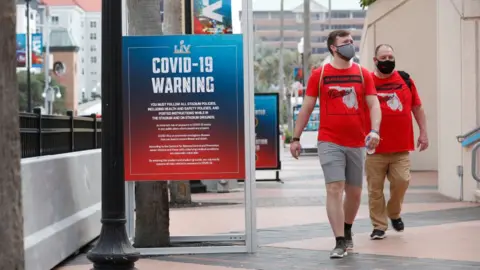UK coronavirus variant spreading 'rapidly' through US, study finds
 Getty Images
Getty ImagesThe coronavirus variant that has moved through the UK is now spreading "rapidly" through the US, according to a new study published on Sunday.
The more contagious strain is nearly doubling its prevalence among confirmed cases in the US every nine days.
The spread of the variant, known as B.1.1.7, has put added pressure on vaccination efforts worldwide.
The US Centers for Disease Control and Prevention (CDC) has predicted it could be the predominant strain by March.
The report, posted on the preprint server MedRxiv, is a collaboration of several researchers and scientists. It has not yet been peer-reviewed or published in a journal.
Case numbers of the new variant are still somewhat small in the US.
According to the CDC, Florida leads the country in reported cases of B.1.1.7 with 187 as of Thursday, followed by California with 145.
"Our study shows that the US is on a similar trajectory as other countries where B.1.1.7 rapidly became the dominant SARS-CoV-2 variant, requiring immediate and decisive action to minimize Covid-19 morbidity and mortality," the report's authors wrote.
This new strain is 35-45% more transmissible than other strains of the virus currently in the US, the report found.
When the CDC first warned of the new variant's presence in the US in mid-January, it was present in less than 0.5% of cases. By the end of the month, this figure had jumped to 3.6%, according to the study.
The report comes as the United States' winter virus surge passes its peak. Daily cases throughout the country have been falling for about a month, since early January. But the average daily death toll remains extremely high - some 3,000 per day - and hospitals remain under immense pressure.
The B.1.1.7 variant, first discovered in Britain, has so far spread to more than 50 countries.
As with the original virus, the risk is highest for the elderly and for those with significant underlying health conditions.
There has been some suggestion that the strain may be associated with a 30% higher risk of death, but the evidence on this is not strong, and the data is still uncertain.
Current vaccines were designed around earlier variants but initial studies have indicated that that the Pfizer, Oxford-AstraZeneca and Moderna vaccines will all protect against the B.1.1.7 strain.

When did you first say 'coronavirus'?
About a year ago, the pandemic hit. We're asking you to search through old text messages and find the first time the term coronavirus (corona or Covid) came up in your conversations.
What do you remember from that exchange? What were your feelings back then? When did you first realise it was going to be life-altering? We want to hear your story.
Please tell us in the form below or email us at [email protected], if you can't view the form.
In some cases, your question will be published, displaying your name, age and location as you provide it, unless you state otherwise. Your contact details will never be published. Please ensure you have read our terms & conditions and privacy policy.
